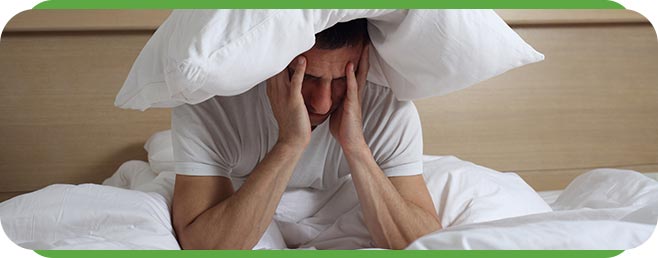Tossing and Turning? Understanding Restlessness in Sleep
Tossing and turning during sleep may indicate underlying issues such as discomfort, anxiety, or sleep disorders like insomnia. At Koala® Center For Sleep & TMJ Disorders, we focus on diagnosing and treating the root causes of restlessness to improve sleep quality. If you’re struggling with sleep disturbances, we offer personalized solutions to help you rest more peacefully. For more information, please contact us today or request an appointment online. We have convenient locations in Bloomington IL, Peoria/Dunlap IL, El Paso TX, and Wausau WI.


Table of Contents:
What causes restlessness during sleep?
Is restlessness at night a sign of a sleep disorder?
How does stress or anxiety contribute to restlessness in sleep?
How does sleep apnea contribute to restlessness?
Restlessness during sleep can stem from a variety of different factors, from physiological imbalances to lifestyle habits that disrupt the body’s natural sleep cycle. Underlying medical conditions such as iron deficiency, thyroid disorders, or neurological issues have the potential to disrupt an individual’s ability to achieve a deep, restorative sleep, leading to frequent movement throughout the night. Additionally, lifestyle factors like excessive caffeine intake, poor sleep hygiene, or disruptions in the sleep environment can contribute to restlessness. When the body struggles to maintain a consistent sleep pattern, disrupted rest can leave an individual feeling fatigued despite spending an appropriate amount of time in bed. In some cases, restlessness may be linked to nutritional deficiencies or imbalances in neurotransmitters that regulate sleep. Underlying health conditions such as restless leg syndrome (RLS) cause involuntary movements that repeatedly interrupt the sleep cycle. Hormonal fluctuations and metabolic issues can also influence the onset of sleep difficulties, making it essential to identify underlying causes rather than simply addressing the symptom itself. At Koala® Center For Sleep & TMJ Disorders, we assess these contributing factors to help patients achieve more consistent and restorative sleep.
Occasional restlessness is common for many individuals, but when it becomes persistent, it may indicate an underlying sleep disorder. Conditions such as restless leg syndrome, insomnia, or periodic limb movement disorder can cause frequent awakenings, leading to an inability to settle into restful sleep. Individuals with these conditions may experience themselves tossing and turning throughout the night, unable to reach the deeper sleep stages necessary for proper restoration. Over time, this disruption can lead to excessive daytime fatigue, difficulty concentrating, and mood disturbances. Sleep disorders that cause restlessness are often able to go undiagnosed for years, as individuals may not always recognize the extent to which their sleep is being disrupted. Those who frequently wake up feeling unrefreshed, experience prolonged difficulty falling asleep, or notice increased movement during the night may be dealing with an underlying condition. At Koala® Center For Sleep & TMJ Disorders, our experts evaluate these symptoms to determine whether a sleep disorder is present and develop tailored strategies to improve sleep quality.
Stress and anxiety are both capable of having a significant impact on sleep, often preventing the body from fully relaxing at night. When the nervous system remains in a heightened state of alertness, falling and staying asleep can become increasingly difficult. Racing thoughts, increased heart rate, and muscle tension can keep the body in a cycle of restlessness. These factors make it challenging to reach the essential deeper sleep stages. Over time, chronic stress can disrupt the production of key neurotransmitters and hormones involved in regulating the sleep-wake cycle, leading to ongoing sleep disturbances. Even if an individual eventually falls asleep, heightened stress levels are capable of leading to frequent awakenings and shallow sleep patterns. This can create a cycle that is difficult to break out of where poor sleep exacerbates stress, and stress further disrupts sleep. Addressing these underlying factors, whether through relaxation techniques, lifestyle adjustments, or professional intervention, can help patients to break this pattern.
Sleep apnea is a common cause of restlessness during sleep. Sleep apnea is a condition that occurs when the airway becomes partially or completely blocked, causing repeated interruptions in breathing throughout the night. Each time breathing is disrupted, the body momentarily wakes up to restore airflow, preventing the individual from reaching deep, restorative sleep stages. While these micro-awakenings may not always be consciously noticed, they can lead to significant restlessness and excessive movement during the night. Sleep apnea and its results also has the potential to contribute to feelings of fatigue and brain fog during the day, as the body struggles to recover from fragmented sleep. Snoring, gasping for air, and difficulty staying asleep are all common indicators of this condition. In the event that it is left untreated, sleep apnea can contribute to more serious health concerns, including cardiovascular strain and metabolic imbalances. Providers at Koala® Center For Sleep & TMJ Disorders assess patients for signs of sleep apnea and will provide targeted interventions to help restore healthy breathing patterns and improve sleep quality.

Additional Services You May Need
▸ KoalaKIDZzz®
▸ Sleep Apnea
▸ Snoring
▸ TMJ Disorder
▸ Fatigue
▸ Sleep Disorders
▸ Weight Loss
▸ CPAP Alternative
▸ Oral Appliances




